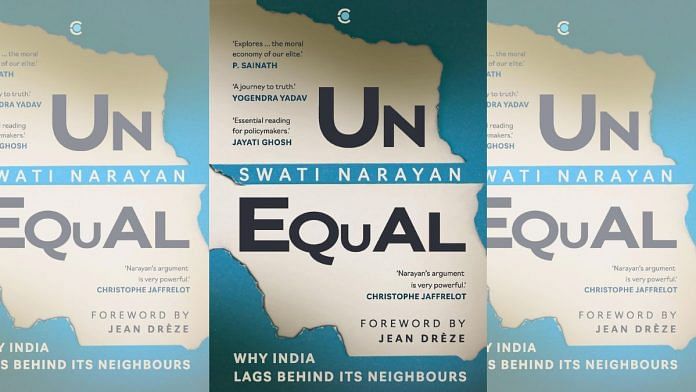Thank you dear subscribers, we are overwhelmed with your response.
Your Turn is a unique section from ThePrint featuring points of view from its subscribers. If you are a subscriber, have a point of view, please send it to us. If not, do subscribe here: https://englishdev.theprint.in/subscribe/
In the last couple of years, a series of books has come out on serious issues like human development, traditional knowledge, climate change, civil wars etc by different authors. Almost all of them, at least those of which I have come across, are brilliant, informative and teaching in character. In ‘Unequal’, Swati Narayan has performed the job of keeping the book one of its own type. She has painstakingly clubbed the details together in order to know the problems in human development trajectory in South Asia and made the solutions working there known.
The author has selected four districts for her study: Kishanganj, a Muslim Majority district, Muzaffarpur (a Hindu-majority district) (both in the state of Bihar, Sindhuli (Nepal) and Panchagarh (Bangladesh). From the extensive travels in the aforementioned districts, she has drawn out chiseled data-facts and socio-facts of developmental outcomes there.
The book comprises 8 heavy, passionately written and data-corroborated chapters. On the broad lines, it explains very wide, yet subtle, contours of the human development landscape, setting a tone for the book. The areas where the book gains salience are in its explanation of the intricate connections between income inequalities, social inequalities, learning outcomes, health outcomes and labour force participation rate (LFPR) etc in the backdrop of Maoist Insurgency in Nepal and Mother Language struggle in Bangladesh, in 1950s and 1960s. In an era, when repeated Oxfam reports and Thomas Pickettys of the world have searingly underlined the division of the world into haves and have-nots, giving rise to deep gorges of wealth inequality manifesting in the form of sociological inequalities, Bangladesh’s and Nepal’s are indeed the sterling success stories.
The book has nicely documented the role of Non-governmental organisations (NGOs), self-help groups, micro-credit, women’s groups, conversation clubs etc in making schools functional, bridging the learning outcomes between the top and bottom quintile children, reduction of poverty, increasing labour force participation rate, making narrative around inequalities concretised etc.
It is one of those very few books wherein the value-harnessing from different struggles and democratic movements has been underscored. Sri Lanka is doing so well today because of its gender transformative movements. Bangladesh is going from strength to strength because of its collective memory of the back-breaking and genocidal subjugation by Pakistan till 1971. After the Maoist Insurgency ended in Nepal, those who couldn’t have dreamt about sitting together before are now brothers and sisters, shouldering together the country’s progress.
In contrast to them, the state of Bihar seems to have been stunned into silence. The entire social spending is at the lowest point. What Bihar truly suffers from is its jinx of Gradational social and caste inequalities. Such gradations are frozen in time. Alongside, the heartfelt initiative is clearly lacking. The proprietorial commandments, prickly haste and straying down from the size-of-GDP model towards honest human development are what are needed to bring about the holistic change in the state.
In the layered political landscape of India, there is a debate these days about North vs South India, set in proper motion by the book, ‘South vs North: India’s Great Divide’ by R.Nilakantan. The developmental indicators like health, education and standard of living in South Indian states like Kerala and Tamil Nadu mirror those of the European countries. In the last two chapters, the book has done micro-detailing of the achievements of Kerala, Tamil Nadu and Sri Lanka, termed as Supermodels, which are geographically contiguous to each other. This has been coupled with concepts like déraciné ( to denote upper caste men in a socially unequal society), equity enhancement for the poor, longue durée (to denote the gradual evolution of civilisations) etc. The best part of the book here is the backgrounding of present developmental manifestations in historical events.
In Kerala, the movements like that of Ayyankali, Vaikom temple entry, subaltern struggles by Mappilas, Channar Women upper cloth struggles (1813-1859), Sree Narayana Guru, and post-independence communist governments etc ensured that the state has an organic success in the reduction of social inequalities despite low gross national product (GNP) per capita. In Tamil Nadu, the Justice Party struggles, Self-respect Movement, anti-Hindi agitations, introduction of Universal Education etc by K.Kamaraj, the policies of both DMK and AIADMK since etc reinforced a strong socio-cultural premium in the force of developmental metrics. In Sri Lanka, the achievements on human development indicators are awesome. Buddhism, has equality as a cardinal principle, was introduced in the country by Emperor Ashoka’s children, introduction of socio-liberal ideas by the colonial powers, Donoughmore Commission (1929), Introduction of Universal Adult Franchise, Health Services Act 1953 etc ensured the front loading of national expenditure on the welfare measures.
Kudos to the author for being near non-partisan in her approach. Loved the book. Very good book.
Uzair Qadri is a teacher.
These pieces are being published as they have been received – they have not been edited/fact-checked by ThePrint


